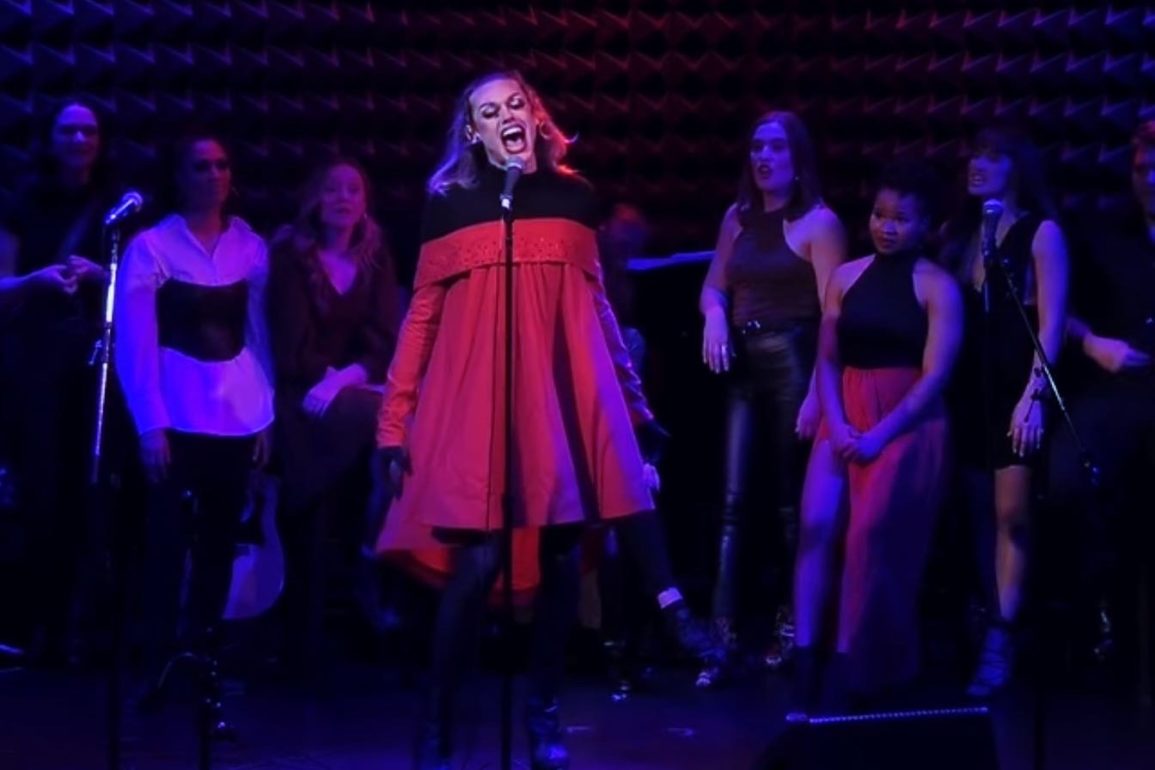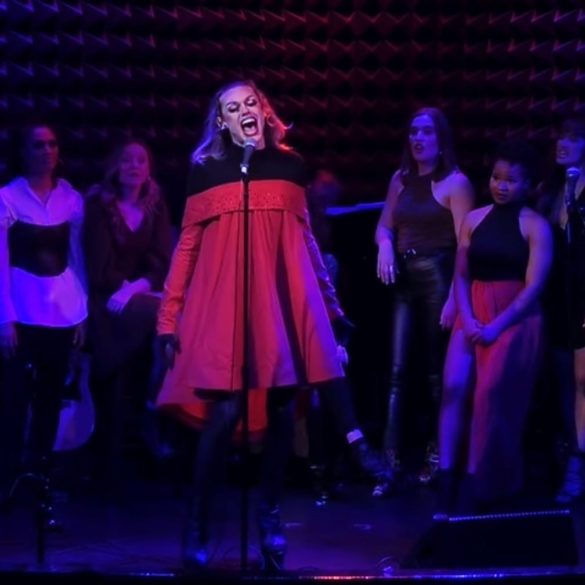Nestled on the corner of Walnut Street and Adams Street in downtown Muncie is the Mark III Taproom. It is most recognizable by the mural on the side of the building and the sound of muffled music from outside of its walls. The gay nightclub is the oldest of its kind in the state of Indiana. It was established in 1968. In today’s time, the club hosts karaoke nights, serves up drinks (such as the house specialty, the Rainbow Long Island) and serves as a home base for Muncie’s drag community.
Kleo Zavich is one of Muncie’s youngest queens. As a part of Ball State’s Musical Theatre program, performing has always been one of her passions. When the pandemic struck the United States in early 2020, Kleo began doing drag out of her home state of Wisconsin. She remembers playing with leftover stage makeup she had in those early months and realizing she wasn’t that bad at it.
“It started as a way to keep performing throughout the pandemic and just keep my artistic bone going,” she describes.
Kleo’s first interaction with drag was through watching VH1’s popular competition show “RuPaul’s Drag Race.” She says her drag style was initially heavily-inspired by Crystal Methyd, a queen who competed on Season 12 of the show.
Kleo was extremely lucky to be able to perform in drag so early. Her home bar in Madison, the FIVE Nightclub, was doing patio shows during the pandemic on account of indoor seating being closed. These patio shows took place in the bar parking lot, where customers would socially distance and support the drag performers. Kleo describes these as picnic tables sitting six feet apart with a bucket in the middle where people would place their tips. At the end, the money was disinfected and brought to the back.
“You would get a wad of soaking wet dollar bills,” she smiles as she recalls. “So I consider myself a quarantine queen.”
Kleo says the drag scene in Muncie is “small, but mighty.” She says shows normally take place between two local bars: Be Here Now and Mark III Taproom. These shows are normally first come, first serve open stages which she admits she isn’t always able to sign up for in time. Despite this, Kleo says opportunities can always be created. She talks about throwing a drag party out of her house early in the semester before the Omicron variant arrived. All the girls invited to perform made around $150 each. Outside of bars and home shows, she has continued doing drag through Ball State.
“School has given me a lot of really cool opportunities to integrate it into my musical theatre work,” she says, detailing a few shows taking place later this spring in Indianapolis and New York City, all sponsored by Ball State’s program.
Perhaps drag’s biggest impact on Kleo’s life has been in helping her develop her gender identity. The freedom of drag is what ultimately led her to identify as non-binary and trans-femenine. These terms are umbrella terms, non-binary meaning a person does not identify with male or female genders and trans-feminine meaning assigned male at birth, but might prefer to present femininely.
“Drag is like using your body as a canvas to create something new,” Kleo describes. “Before I had never really processed any of those other parts of my personality, but now I’ve unlocked memories of feelings I buried [regarding gender] when I was going to Catholic school and playing hockey.”
Venus Entertainment is another well-known Muncie drag performer. A self-proclaimed “old queen,” Venus started doing drag nine years ago when attending Ball State. Their home bar is Be Here Now. They recall being super inspired by Lady Gaga’s 2013 album ARTPOP, the second song on the record being the origin of their drag name. Similarly to Kleo, Venus also watched a lot of “Rupaul’s Drag Race” growing up. They say drag “just seemed right.” Despite these listed inspirations, Venus’ first time in drag was not what the average person might expect.
“It was kind of like something we did for Halloween,” they say. “I feel like that’s how every queen starts…dressing up for Halloween once.”
Drag turned into a lot more than just a Halloween costume for Venus. They now use her platform to share her art and creativity for good, making connections with people through music in order to have important conversations about mental health and other issues. They headline shows at the Mark III Taproom every other month where they give other queens and burlesque dancers the opportunity to perform as well. Venus says the overall goal is to end division within the community.
“Drag and burlesque belong together,” they say. “We already face so much division outside our community, we have to stay together inside [the community].”

Venus is not only a drag performer, but is also one of drag’s biggest fans outside of her own persona. They regularly goes to shows even when their not performing in them. They use this as criteria when they book shows. In order to get a spot, they say, it’s important to support your local drag artists first.
“I really respect when other entertainers go to shows out of drag,” they say. “If you’re not supporting drag, come support them and let’s get you in.”
Drag houses or dynasties are some of the most common community-building practices within drag. These houses represent different groups of drag artists who share a “mother,” or the queen who first put them in drag or with whom they share a last name. Venus has a couple of drag children and grandchildren. For her, drag families and unity are much more important than what many commonly think of as “drag.”
“Drag does so much more than just putting on these shows that you go to at night,” they explain. “It’s about bringing the community together, doing charity events and inspiring people.”
Venus says drag should be an escape from the outside world, leaving your problems at the door and just loving one another and yourself. They note that, especially in the last three years, it has become incredibly important to have that sense of community throughout the pandemic. They hope to continue taking drag to places where it isn’t normally found.
“We don’t have to be limited to a queer space,” they say, “you know, everybody else has all these spaces they can go to and we only have queer spaces, but no, every place should be queer friendly.”
Venus is hosting their next show on March 26 at the Mark. There is a $10 cover fee and guests must be 21 and up to enter.
Sources: Mark III Tap Room
Images: Provided by Kleo Zavich
Featured Image: Provided by Kleo Zavich




